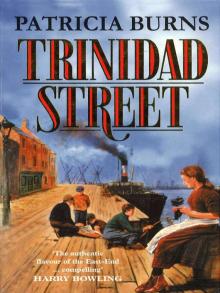- Home
- Patricia Burns
Bye Bye Love Page 11
Bye Bye Love Read online
Page 11
The incident of the Americans plus the compliment about the salad had changed the general attitude towards him in the restaurant. He was no longer the stupid English boy, M Bonnard’s odd choice, but someone who might actually make himself useful. He was still teased and treated as the bottom of the heap, but he was beginning to prove himself.
The best news of all is that I’m to move to patisserie. That means learning all the different pastries and the dishes you can make from them. When I next come home I’ll make you some yummy fruit tarts or profiteroles. You’ll love them! But not half as much as I love you…
Dear Jonathan,
Thank you so much for the lovely card. It is so pretty, I have stuck it up on my wall next to the postcard of the Eiffel Tower and I look at it every morning and every evening and think of you over there in Paris. The scarf is beautiful. I wear it all the time I’m not at school. I think it’s the nicest birthday present I’ve ever had.
In fact, it was the only birthday present she had that year. Her father had completely forgotten and she hadn’t told anyone at school because she couldn’t invite them to a party. The card and present from Jonathan had just about redeemed a day that had almost been as dreadful as Christmas. Once more she had cried herself to sleep, longing for her mother and the life they had used to live.
I could leave school now that I’m fifteen. If I got a job, we could afford a better flat, but I really want to stay on till the end of the summer term and take the exams and get a certificate to show I’m not stupid.
Scarlett sucked the end of her pen. What she really wanted to do was to stay on the extra year till she was sixteen and take O levels. With O levels she could do anything. She could get an office job up in London and catch the train each morning wearing nylons and high heels. She longed for nylons and high heels.
Some of the girls in her class were planning to leave at the end of term and learn shorthand and typing. Typists, they claimed, earned more than clerks, and if you had good shorthand as well, you could get to be a secretary and have your own desk and telephone.
‘And get to marry the boss,’ one of them said.
The rest shrieked and giggled, but they all secretly liked the idea. After all, working was only something you did to fill in the time before you got married, and marrying the boss was definitely a step up from the boy next door.
Scarlett quite liked the idea of being a typist, even though she had no idea what it really entailed. But lessons cost money, more money than she could earn at her Saturday job. And it was no use asking her father. It was bad enough getting the rent money out of him each week, plus a bit extra for food.
I’d really like to be an actress or an air hostess. I got a book out of the library about careers for girls, and I’m too young to apply to be an air hostess yet. They like you to have some knowledge of first aid and to be able to speak a foreign language, so I’ve joined the Red Cross and I’m learning all about bandaging and how to treat people for shock, which is quite interesting, but the woman running it is a right bossy cow. She keepscalling me Crimson instead of Scarlett. Everyone laughs obediently as if it’s a huge big joke. I expect it’s the same with your Little Salad. Or do they call you something different now you’re in the pastry department? As for the foreign language, I did learn a bit of French at my last school but they don’t do it at this one. We have to do sewing instead. I hate sewing. Anyway, I thought that when you come home next time you could teachme some French. I’m so longing to see you again. The summer seems such a long way away.
August. It would be August before he could take a break. Nobody important stayed in Paris then, Jonathan told her, so the restaurant closed for the month. Some of the staff got jobs in restaurants or big hotels by the sea, but Jonathan was coming back to Southend. It was like a great beacon ahead of her, lighting the dark times. But it wasn’t even Easter yet, and it seemed an interminable wait. She hardly knew how she would get through it.
CHAPTER ELEVEN
‘BLOOMING history.’
Scarlett stared at the pages of the textbook, trying to make sense of it. She really couldn’t work up any interest in the Great Reform Act, but she had to get this homework done this evening because they were short of textbooks at school and she had to pass hers on to another girl tomorrow morning.
As she tried to work out what to write down in her exercise book, she heard a banging noise downstairs as the front door was shoved open. She didn’t take much notice. There was always someone clattering up and down the stairs, or playing music or thumping on the walls and shouting for some quiet. Then she realised that the heavy footsteps were coming up the last set of stairs to their floor. She glanced at her watch. Eight-thirty. It couldn’t be her father, not halfway through the evening. She looked at the door, trying to remember if she had locked it. They were an odd lot in some of the rooms. One or two she definitely did not want in her flat. Then she heard a familiar cough, and the door handle rattled.
‘Scarlett? Scarlett, open the door.’
‘Dad?’
Her stomach sinking with foreboding, Scarlett went to let him in. Victor lurched through the door, bringing a wave of whisky and beer-flavoured breath with him. He staggered across the room and collapsed onto the put-u-up.
‘What’s happened? Why are you back here so soon?’ Scarlett demanded, though she knew the answer already.
Victor dropped his head into his hands.
‘Bastards,’ he mumbled. ‘Bastards. Don’t give a man a chance. Working in a pub and they won’t let you have a drink. Bloody ridi—ridic—’ swhat a pub’s for, drinking.’
Scarlett stared at him, appalled. How could he be so stupid? How did he even manage to get so drunk so early in the evening?
‘You’ve gone and got the sack, haven’t you?’ she accused.
Victor looked up at her as she stood over him, hands on hips. He seemed startled by her reaction.
‘No good working there anyway. Never did like it. Mean lot,’ he said.
Anger boiled up inside Scarlett. Things had been bad enough, but they had managed. Now they were a whole lot worse, and all because he wouldn’t stop drinking.
‘How could you? You know how difficult it was to get that job, and now you’ve gone and lost it. Of course they sacked you. How can you take money in that state? You don’t know what you’re doing.’
Victor was gaping at her.
‘Now then, girl. ’S only a little drink. Little drink never hurt no one.’
‘Little drink! How much have you had? And how much did it cost? We’re out of gas money again, and you’ve been drinking whisky chasers.’
‘No—no—only a beer or two—’ Victor protested.
Scarlett snorted her disbelief. Not for nothing had she been brought up in a pub. She knew the smell of Scotch. Furious, she used the strongest weapon at her disposal.
‘What would Mum have thought of you?’
The moment the words were out of her mouth, she knew she should not have said them. Victor seemed to crumple before her eyes. He put his elbows on his knees and held his face in his hands. To Scarlett’s horror, she saw his shoulders shake.
‘I know…I know…I failed her. The most wunnerful, wunnerful woman…’
Harsh sobs were torn from his throat.
Scarlett’s anger evaporated, leaving her shaken and frightened. How had this happened? How had her big strong father turned into this broken creature? She put her hand out and stroked his head.
‘It’s all right, Dad,’ she said soothingly, as if talking to a child. ‘It’s all right. You’ll get something else.’
‘No, no—’ s not all right. Lovely girl like you. I should’ve done better. Lovely girl. Best daughter in the world—’
It was all too much. Scarlett could only fall back on her mother’s failsafe remedy. She went to her secret cache of money and got yet another shilling.
‘I’ll make some tea,’ she said.
Later, after she had left her father snoring
on the put-u-up, she took out the letter she was writing to Jonathan. She usually took two or three days over them, stringing out the pleasure of confiding in him. What was she going to say to him about this? Loyalty to her father along with a sense of shame stopped her from writing about what had just happened, however much she wanted to share the bad news with someone. She felt very alone. She put the writing pad away again and got into bed. For a long time she lay awake, turning her next move over and over in her mind. Perhaps it would all turn out all right. Perhaps her father would get another job within a few days and she would be able to stay on at school, at least until the end of the summer term. Perhaps.
It was not to be. Every day when she left for school, Scarlett gave her father a cup of tea and asked when he was going to go and look for another job.
‘Today. I’ll go later on today,’ he promised. ‘No use getting anywhere at this time in the morning.’
Which was true enough. When she got in from school, he shook his head and sighed and said he had looked all over and there were no vacancies anywhere. Scarlett sympathised and asked where he had been and suggested looking further afield. Then on Friday, coming home a different way from school, she passed a pub where her father had said he had asked for work. Outside on the pavement was a blackboard with ‘Experienced barman wanted’ written on it. She marched home. Victor was lying on the put-u-up with a bottle of beer in one hand and a cigarette in the other.
‘I thought you said you’d asked at the Grapes,’ she said.
Victor looked shifty. ‘What? The Grapes? Er…yes, yes, I think so.’
‘And they didn’t have anything?’
‘Er—no.’
‘Well they have now. There’s a notice outside.’
‘Oh. Well, things must have changed, then. That’s good. I’ll go back and ask again. Good girl. Clever of you to spot that.’
Scarlett gave him a considering look. She didn’t like to suspect him. After all, the notice could have been put there only that morning. She went round to the corner shop and bought a packet of peppermints from Mrs Sefton, then made toast and jam for tea.
‘I didn’t get anything nicer because we’ve got to have enough to pay the rent tomorrow,’ she explained.
She chivvied Victor into combing his hair and polishing his shoes, gave him a clean shirt and a peppermint and shoved him out of the door at ten to six.
‘You’ll be there for opening,’ she told him.
Half an hour later, he was back.
‘They wanted someone younger,’ he explained.
The next morning, Victor called from the other room as Scarlett was getting ready to go out to her shop job.
‘Yes?’
‘Er…do you think Mrs Sefton’d let you have a sub from your wages?’
Scarlett knew just what was coming next. Anger warred with resignation within her.
‘Why?’ she asked.
‘Well…er…we haven’t got quite enough for the rent.’
‘Why’s that?’ she said, though she knew the answer perfectly well. He wasn’t earning, but he’d still spent a full week’s beer and fags money.
There was a mumbled er-ing and ah-ing from the other room, and something about the bastards giving him the elbow. Scarlett stared at the wardrobe where her small cache was hidden. That was her money. But the rent had to be paid. Still sharp in her mind was that time when they had walked out of the Trafalgar, and the dreadful feeling of having nowhere to call your own. Even this nasty little flat was better than nothing.
‘How much do we need?’
‘Er…not a lot…’
Exasperated, Scarlett stumped out to where Victor was sitting up in bed with this second cigarette of the day.
‘How much, Dad?’
He fiddled with the blanket, avoiding her hot eyes.
‘Ten and six.’
‘Ten and six! That’s more than a small sub. I don’t earn that, Dad. It’s only a Saturday job.’
‘I know, love, I know. But…oh, well, maybe the old cow will let us owe a bit. Just this once.’
It was a quarter of their week’s rent. If they got behind this week, and her dad didn’t get a job next week, where would they be? Out on the street.
‘I’ve got a bit saved up,’ she admitted.
Relief flooded Victor’s face.
‘You’re an angel! A guardian angel! I’ll give it you back as soon as I get paid.’
Before she could stop herself, Scarlett asked, ‘And when’s that going to be?’
She could see the hurt in his eyes and knew she shouldn’t have said it. Her mother would have been horrified to hear her talk like that to her own father.
‘As soon as I’ve paid the old vulture her rent, I’m going out and I won’t come back till I find something,’ Victor promised.
Scarlett the child wanted so desperately to believe him. Scarlett the young woman had her doubts, and hated herself for it. She bent down and kissed his head.
‘That’ll be good. Must dash, I promised Mrs Sefton I’d be early today.’ Bye, Dad!’
Her doubts were justified. They had only her Saturday job money to keep them in food and gas all week, so there was nothing for the rent. Their landlady told Victor that they could have one week on tick, but after that they were out.
‘There’s plenty more want a nice little place like this,’ she told him.
Victor agreed with everything she said, and went downstairs to borrow cigarette money from one of the other tenants.
‘It’ll soon be Easter, and then the seasonal jobs’ll start,’ he told Scarlett.
Lying awake with her stomach growling with hunger, Scarlett fought against coming to the inevitable conclusion. They couldn’t hold out till Easter, not without borrowing so much that they’d never catch up with themselves. And it was no use asking her father to get a factory job. He wouldn’t last a week having to get to work at eight. She stared at the ceiling, where the feeble light from the street lamp shone through the threadbare curtains and illuminated the flaking whitewash. All her dreams of becoming an air hostess were just that—dreams. Nor would she be a typist or a clerk in an office. She would have to leave school now and get whatever job paid the most.
‘Why don’t you try some of the shops in the High Street?’ Mrs Sefton suggested when Scarlett explained the situation. ‘That’s a nice career for a smart young girl like you. You’re good in a shop. Anyone’d be glad to have you. I’ll give you a reference.’
‘Oh, you don’t want to do that,’ her friend Margie at school said. ‘The pay’s rubbish. Get a factory job. You go to one of them new places making electrical stuff and do piece work. That’s what my sister does. She earns loads. And they got canteens.’
It was the thought of a decent meal that did it. After school that day, Scarlett trekked out to the edge of town where the new factories had gone up, stopped at the first one with a vacancies sign outside, took a test to prove she had nimble enough fingers for the work and got the job.
‘Can you start tomorrow?’ the woman in Personnel asked her.
‘All right,’ Scarlett agreed.
And that was it. Walking home, she felt elated. She was a grown-up now. She had a proper job with the proper wage. No more school. No more stupid homework about the Great Reform Act. She was taking her place in the world of work.
‘You didn’t have to do that, love,’ her father said when she told him.
But they both knew that she did have to. That evening they had nothing but bread and margarine for tea, and that had been put on the slate at Mrs Sefton’s. They both knew how disappointed her mother would have been that Scarlett had left school, but neither of them said anything more on the subject. It was too painful to pursue.
The next morning Scarlett got up at seven in order to walk out to the factory. The personnel officer gave her a clocking-in card and handed her over to a hard-faced middle-aged woman wearing a navy-blue overall and a headscarf. On her large bosom was a badge declaring that she
was Mrs Laver, Forewoman.
‘I hope you’re neat with your fingers,’ she said, looking Scarlett up and down.
‘They gave me a test yesterday and I passed it,’ Scarlett said.
Mrs Laver snorted her contempt at tests.
‘I’ve had enough of you kids spoiling whole consignments.’
She showed Scarlett where to push her card into the clock to prove that she had come in on time, and place it on a rack under S for Smith. Then she showed her the cloakrooms and handed her a nylon overall several sizes too big.
‘Roll the sleeves up. You brought a headscarf? Right. Tie it over your hair. You don’t want to go getting it caught in the machines. You used any sort of machine before? No? Why aren’t I surprised?’
The factory was huge, with racks of components, power lines and rows of girls at machines stretching off into the distance. What struck Scarlett the most was the noise—the whirring and clattering, the thudding and vibrating of hundreds of small drills and riveters and punches.
‘Toilets over there,’ Mrs Laver said, waving an arm.
Scarlett looked to where she was pointing and saw brown-painted doors in the high wall at the side of the building, but she wasn’t really concentrating. It had just struck her why she disliked this woman so much. She reminded her of Jonathan’s mother. It wasn’t the way she looked, it was her manner. She could feel herself wanting to disagree with her at every turn.

 Packards
Packards Bye Bye Love
Bye Bye Love Follow Your Dream
Follow Your Dream Trinidad Street
Trinidad Street We'll Meet Again
We'll Meet Again